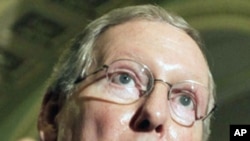U.S. lawmakers are staking out partisan positions ahead of Thursday's meeting at the White House in search of a bipartisan formula to improve the nation's fiscal outlook. The gathering, to be hosted by President Barack Obama and attended by congressional leaders of both major parties - Democrats and Republicans - comes less than a month before a deadline to raise the federal borrowing limit and avert a possible default on America's $14.3 trillion national debt.
With the United States teetering on the edge of a debt crisis that experts warn has global financial implications, several lawmakers say they hope for fruitful negotiations free of partisan rancor.
Republican Senator Johnny Isakson of Georgia:
“I hope it will be a summit where both sides leave their weapons at the door, sit across the table from one another, and begin talking about a comprehensive solution to a comprehensive problem," said Senator Isakson.
Whether congressional leaders leave their rhetorical weapons behind when they go to the White House remains to be seen. But on the eve of the talks, harsh rhetoric was in abundance on the Senate floor.
Democratic Senator Charles Schumer of New York criticized Republicans for refusing to curtail tax breaks enjoyed by wealthy Americans and specific corporate interests.
“In the home stretch of negotiations, our Republican colleagues seem to be willing to tank [destroy] the economy rather than end a single tax subsidy," said Senator Schumer.
Republicans took verbal shots of their own. Senate Minority Leader Mitch McConnell:
“Until now, the president’s proposals have been inadequate and, frankly, indefensible," said Senator McConnell. "It is ludicrous for the administration to propose raising hundreds of billions [of dollars] in taxes at a time when 14 million Americans are looking for work and job creators are struggling.”
The goal of Thursday's talks is to arrive at a bipartisan agreement to slash the federal budget deficit and slow the growth of the national debt. Absent such a deal, Republicans say they will not vote to increase the federal borrowing limit. Unless the debt ceiling is raised, the U.S. government is expected to run out of funds by August 2, which experts say could provoke a default on America’s massive debt obligations.
The main point of contention is whether to boost government revenues and slash federal spending to improve the nation’s fiscal health, or to rely on spending cuts alone.
Democrats stress the need for what they call “shared sacrifice.” Senator Richard Durbin of Illinois says that if programs benefiting the poor and vulnerable are to be cut, it is only fair to ask the wealthy to pay more taxes.
“Americans are willing to step up and participate in a national effort," said Senator Durbin. "So when we come down here and talk about solutions to problems, let us talk about everybody rolling up their sleeves and getting involved. We should not say that anyone in America who is wealthy and comfortable in life is going to be spared from sacrifice. Everybody has to give.”
Republicans counter that tax hikes of any kind would deter job creation and economic growth, worsening government finances. They warn that additional federal revenue will lead to more government spending instead of deficit reduction.
Senator John Cornyn of Texas:
“I fear that so much of what we are hearing about tax increases is just to allow the spending binge to continue, and Washington will not change its ways," said Senator Cornyn.
Unless one party surrenders and adopts the other’s demands, compromise will be required to forge a debt reduction agreement. As President Obama prepares to receive congressional leaders at the White House, signs of compromise are lacking.
Partisan Debate Abounds on Eve of US Debt Talks




